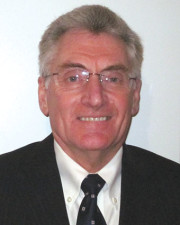
Elliott Gottschalk
& Associates
OK, so most of us are over the Patriots loss and as Tom said to his children, you can’t win them all. I’m looking forward to the Celtics, Bruins and Red Sox continuing to have very good seasons. Who knows, there may even be another championship lurking out there. Let’s hope the Federal Reserve doesn’t go too far with an interest rate increase.
I do, however, want to talk about two unsettling items I’ve come across in the past week. To start, and I can’t really put a finger on it, but when did appraisers fall into the “we don’t need them anymore” category? It is really perplexing to me as we, as a profession, used to be held in such high esteem.
Here are the two examples I find troublesome:
Several months ago I wrote about FNMA and FHLMC striving to eliminate the need for appraisals and more recently, First American Mortgage Solutions, a provider of solutions covering the residential loan spectrum, launched its new appraisal solutions technology and bringing on its first network of in-house appraisers. These solutions include AVM’s, BPO’s and the bright and shiny new “hybrid appraisals.” Well guess what? Moody’s Investors Service has come out with a report indicating that all of these non-traditional approaches to valuing residential property could, and I quote, “In seeking to reduce operational costs, increase efficiencies and address the shrinking ranks of US property appraisers, mortgage market participants are exploring the use of alternatives to traditional means of calculating property values and, in some cases, starting to use them more,” Moody’s analyst Lima Ekram said. “Their use in tasks that affect the credit quality of RMBS securitization collateral could, however, lead to a weakening of new RMBS transactions.” HAH! How do you like that! Here’s Moody’s, who nearly caused the economy to sink back in 2007 by not properly grading the RMBS now coming out and saying non-traditional appraisals could be problematic down the road and result in less secure RMBS.
And now, hot off the press, I’ve got another one. Just today, this headline assailed me when I opened my emails from The Appraisal Institute: “North Carolina Supreme Court Allows Brokers’ Fair Market Value Testimony.” As this tale rolls out, it seems the plaintiff hired a real estate broker to opine about the value of two acres of commercial land that had been condemned by the North Carolina Department of Transportation. At trial, the NCDOT pointed out real estate brokers were not permitted to give testimony regarding value and the court agreed. It was appealed, and the Court of Appeals unanimously affirmed the trial court’s decision. The plaintiff then petitioned the state Supreme Court to exercise “discretionary review” of the decision of the Court of Appeals.
Here’s where it comes off the tracks. The State Supreme Court stated, and again I quote: “the authority allowing experts to testify is found in the state’s Rules of Evidence, and not in a statute such as the one that allows licensed real estate brokers to offer broker price opinions and comparative market analyses.” Essentially, the court gives minimal credence to all our classroom hours, field experience, demonstration reports, designations and state license exams. Here, MBREA and AI are working to get Massachusetts to be a mandatory state, whereby all appraisals must to be performed by licensed or certified appraiser and the geniuses on the Supreme Court in North Carolina are saying, no, that’s not really all that necessary. Silly, silly, silly.
These are two examples of what’s happening out there. I guess my parting thoughts are to continue to perform appraisals at the highest levels of which you are capable. Give no one any reason to say anything bad about the quality of the work we perform. Our professional lives are being battered and our only response should be to continue to raise our game to a level where real estate appraisers are at the head of the class as far as individuals whose profession is based on ethics and competency.
Steven Elliott, SRA, MRA, is principal at Elliott Gottschalk & Associates, Ashland, Mass.








